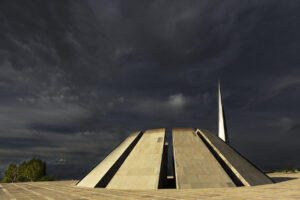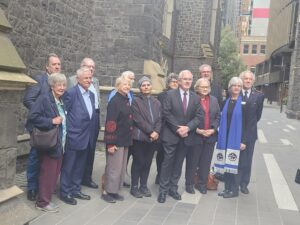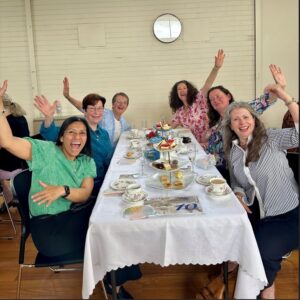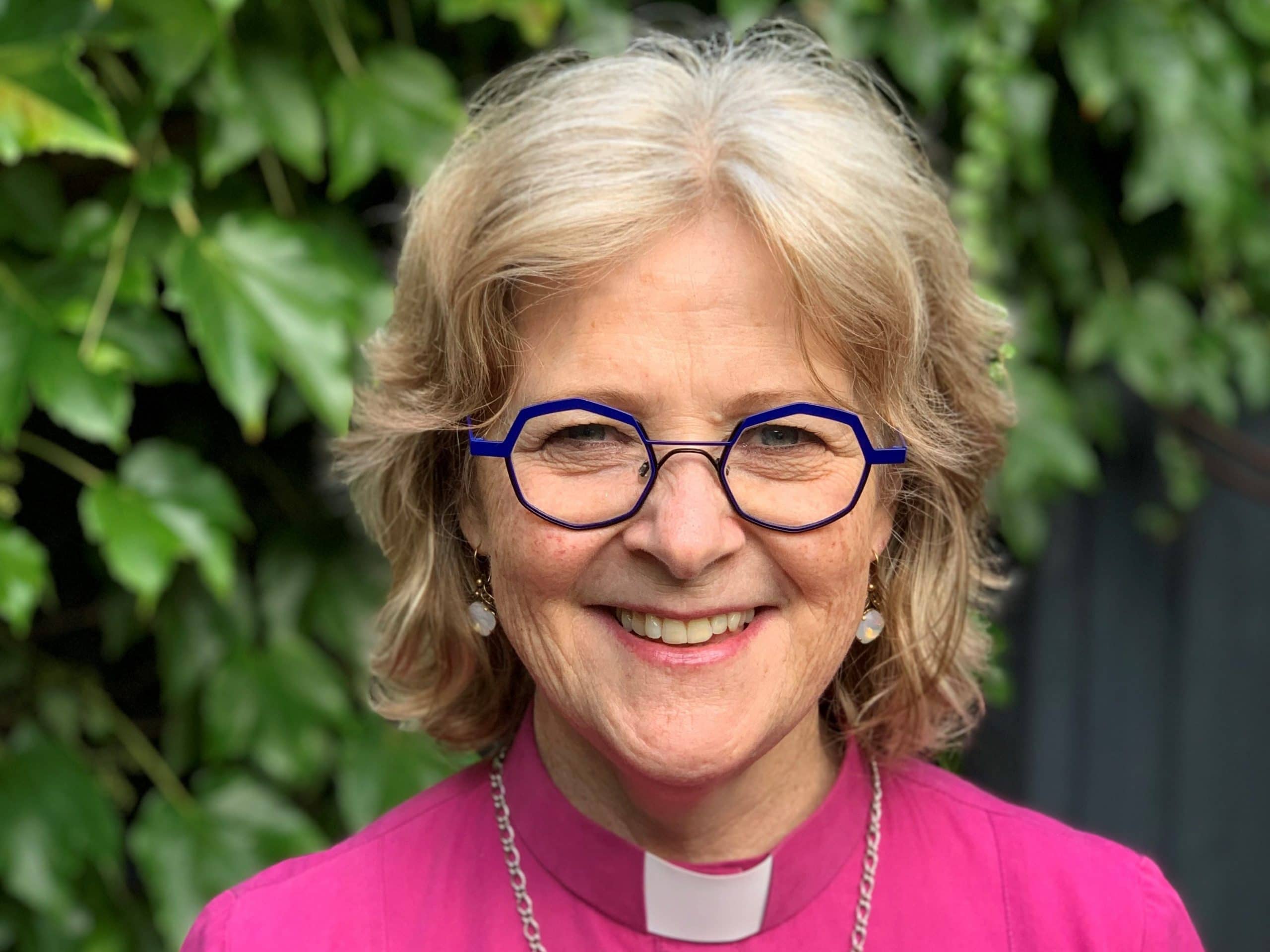
By Mark Brolly
4 February 2022
WOMEN remain undervalued in the church despite 2022 marking 30 years since their ordination as Anglican priests in Australia, according to one of Melbourne’s first women to be ordained.
Melbourne Assistant Bishop Kate Prowd said there was still a long way to go for women to be fully valued in the church as well as wider society, reflecting on her own priesting in 1992.
The ordination of 33 women to the priesthood in Melbourne came after the 1992 General Synod voted to allow Australian dioceses to make their own decision on the issue. The synod only narrowly reached the required two-thirds majority to pass the bill.
Bishop Prowd said there was a great sense of historical significance at the ordination ceremony in 1992, with three groups of women ordained over three services in December because so many had been waiting.
The Reverend Elizabeth Alfred, who had been a deaconess since 1944 and deacon since 1986, was the first of 33 women priested in Melbourne, then aged 78.
Then in her early 30s, Bishop Prowd was among the youngest.
She said there was a sense that women had “arrived”. But at the same time a leader of the Movement for the Ordination of Women Dr Janet Scarfe warned the new priests not to rest on their laurels.
“There’s still a long journey to go and we must always be on the journey,” Dr Scarfe told them.
Bishop Prowd said this situation was not unique to the priesthood, or the ordination of women.
“When we look at our society and what we’ve been observing about women in politics, economically, socially re sexual abuse – and we know the Church is not immune from this – it’s really important for women in leadership to keep those conversations on the table,” Bishop Prowd said.
“All the wonderful work that’s been done in the diocese in [the] Prevention of Violence Against Women [program] is not finished … it’s never a full stop.
“We’ve got to call out misogynistic behaviours and attitudes, and discrimination. Women aren’t the only ones to do that but women as leaders encourages other women to find their voice.”
Women were first ordained to the priesthood in Melbourne in December 1992, after General Synod voted narrowly to allow individual dioceses to decide on the ordination of women.
The final vote came after six hours debate, with just two votes giving it the required two-thirds majority in the House of Clergy.
Diocese of Melbourne publication See wrote at the time that most of the women were continuing in the ministries in which they were already working.
Preaching during the first ordination service on 13 December, Archbishop Keith Rayner said the normal joy of ordinations was “immeasurably magnified” on what he described as a historic occasion.
“We thank God for the women who have had much pain to bear in their years of waiting,” he said.
“My overwhelming impression … has been of women struggling, usually to their amazement, with the growing conviction of God’s call to the priesthood.”
Bishop Prowd said it was important to remember that the first women priested in Australia were ordained on 7 March 1992 in Perth.
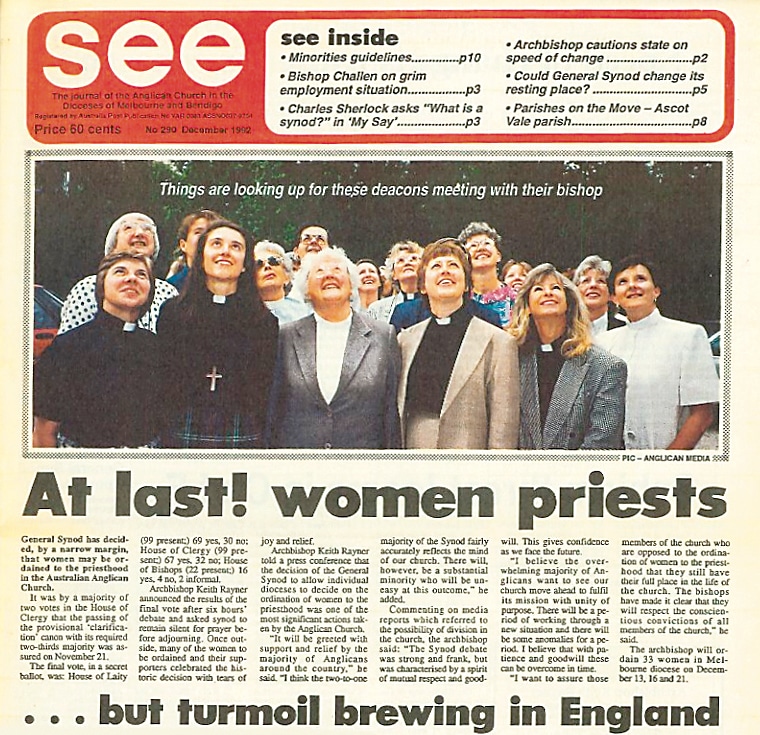
Of her own priesting, Bishop Prowd said there was a strong sense of the big occasion.
She can vividly recall the women walking down the stairs at the cathedral buildings before the service with everybody else assembled one floor down, and then all the men applauded them.
“I couldn’t fight back tears streaming down my face, it was just so humbling that sense of responding the best way I knew to what I believed to be God’s call,” Bishop Prowd said.
An enduring part of her ministry has been her brother Lindsay Urwin, also a bishop, and opponent of women’s ordination.
Bishop Lindsay is vicar of Christ Church Brunswick, having spent many years as a priest and bishop in England. Bishop Prowd said Bishop Urwin had reservations about the authority of one branch of the church to ordain women, and so had not participated in their ordination. However he accepted they had been ordained in good faith.
Despite his stance on women’s ordination, Bishop Prowd’s brother was present at her first Communion at St Agnes’ Black Rock in 1992 and at her episcopal consecration 26 years later.
She said he had been there – in spite of himself – every step of the way. It’s led to them both having an unexpected gift to offer the church: learning to love in difference.
“For many years, his position on the ordination of women was really hard for me personally, much harder for me than for him. He was getting on with his ministry of course … but in my thinking it was, ‘Somehow I’ve got to convince him, why can’t he be converted, why can’t he just see sense?’” Bishop Prowd said.
“Now, and this is the grace of God after many conversations, many tears …we’ve learned how to love in difference.
“That has been an unexpected gift I can offer and he can offer too. We don’t sort of parade it and say, ‘Look at us, we know how to do it’ but we’ve had to learn how to do that because we mean so much to each other.
“Ironically if you like, or maybe again by the grace of God, he has been one of my biggest supporters as a bishop. He’s been there for me every step of the way, he mentors me, he advises me, he’s the go-to person for me.”
Bishop Prowd said through this she had also learnt it was unwise to label people into neat categories such as “traditionalist” or “feminist”.
“[This is] really important in the Church, and I can see this in my own role in the episcopate where probably there’s a majority of Evangelicals, it’s incumbent upon me to be able to minister with them and respect them – and I do,” she said.
Bishop Prowd also worked as a clinical psychologist after ordination, but felt there was something missing. In a similar way, when she worked as a priest without that psychological component, she also felt there was something missing.
“I really had a very strong sense of that dual vocation,” she said.
“For me, there was always that ‘third being’ in the room. In my practice, I always used to light a candle as a tiny gesture and as a reminder that we were both, myself and the client, were in the presence of God.
“My job as a clinical psychologist wasn’t to proselytise but the candle reminded me that all we do and are happens in the light of grace and love and forgiveness.”
Bishop Prowd said she and her husband Roger – also ordained – became a novelty as one of several clergy couples in the early days, but that he and their three daughters had been very supportive of her.
She said things had come a long way since she was seeking her second position as a deacon, when an archdeacon who was interested in having her in his parish asked: “And when are you having your next baby?”
But she said sometimes comments were still made by male leaders in the church which prompted her to think: “Can you just hear yourself?”
“There have been great gains in the Church since women were ordained and we’ve travelled a long way from being a kind of novelty and trailblazers … Women’s ordination is the norm [now] – Praise God,” Bishop Prowd said.
“Women up front in leadership, both ordained and lay, reflect that diversity of leadership in the Church. And this contributes to the richness of the Body of Christ.
“Women will keep reminding the Church and the world that we are part of the story of God, and our voice needs to be heard … That’s being faithful to our baptismal claim.”

